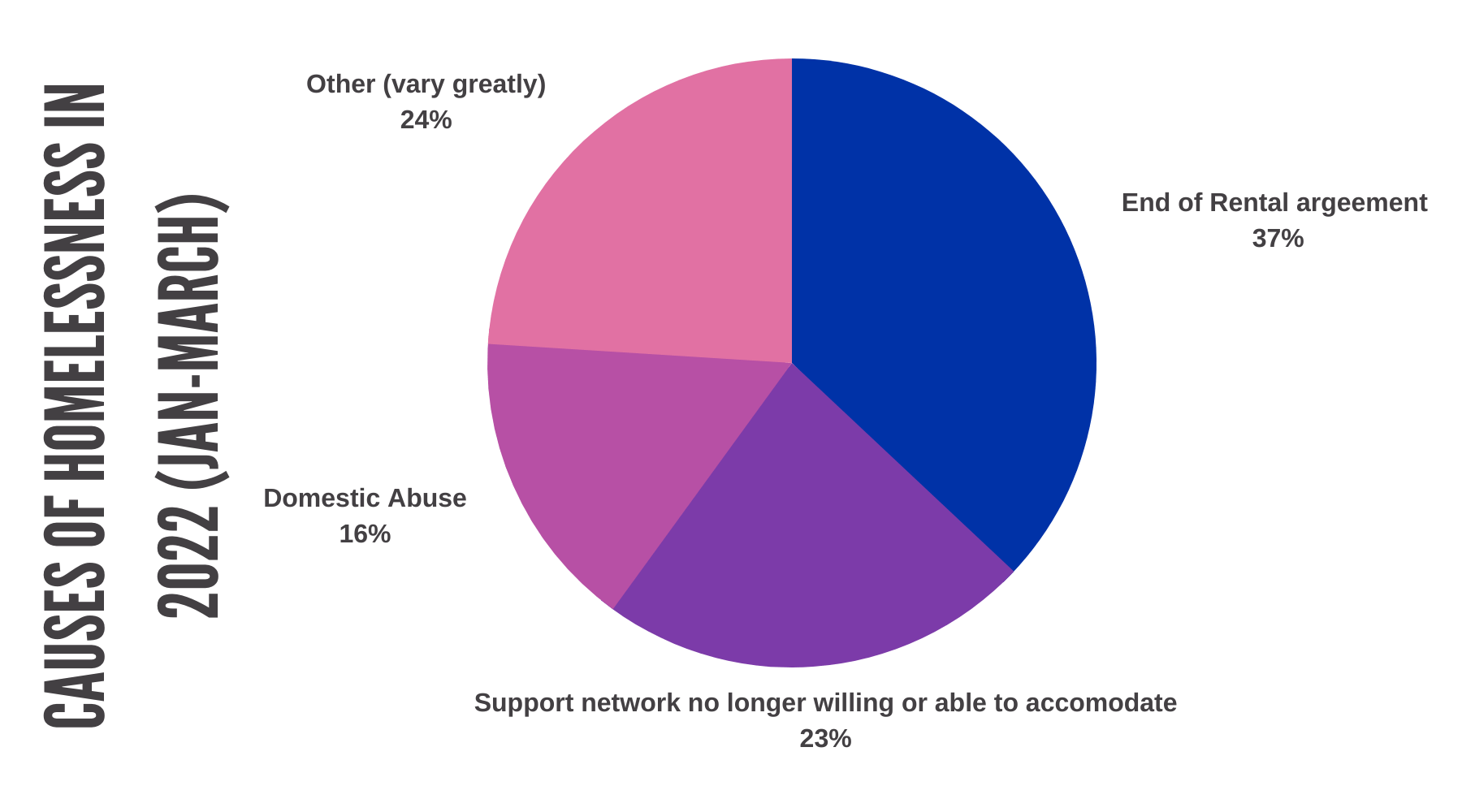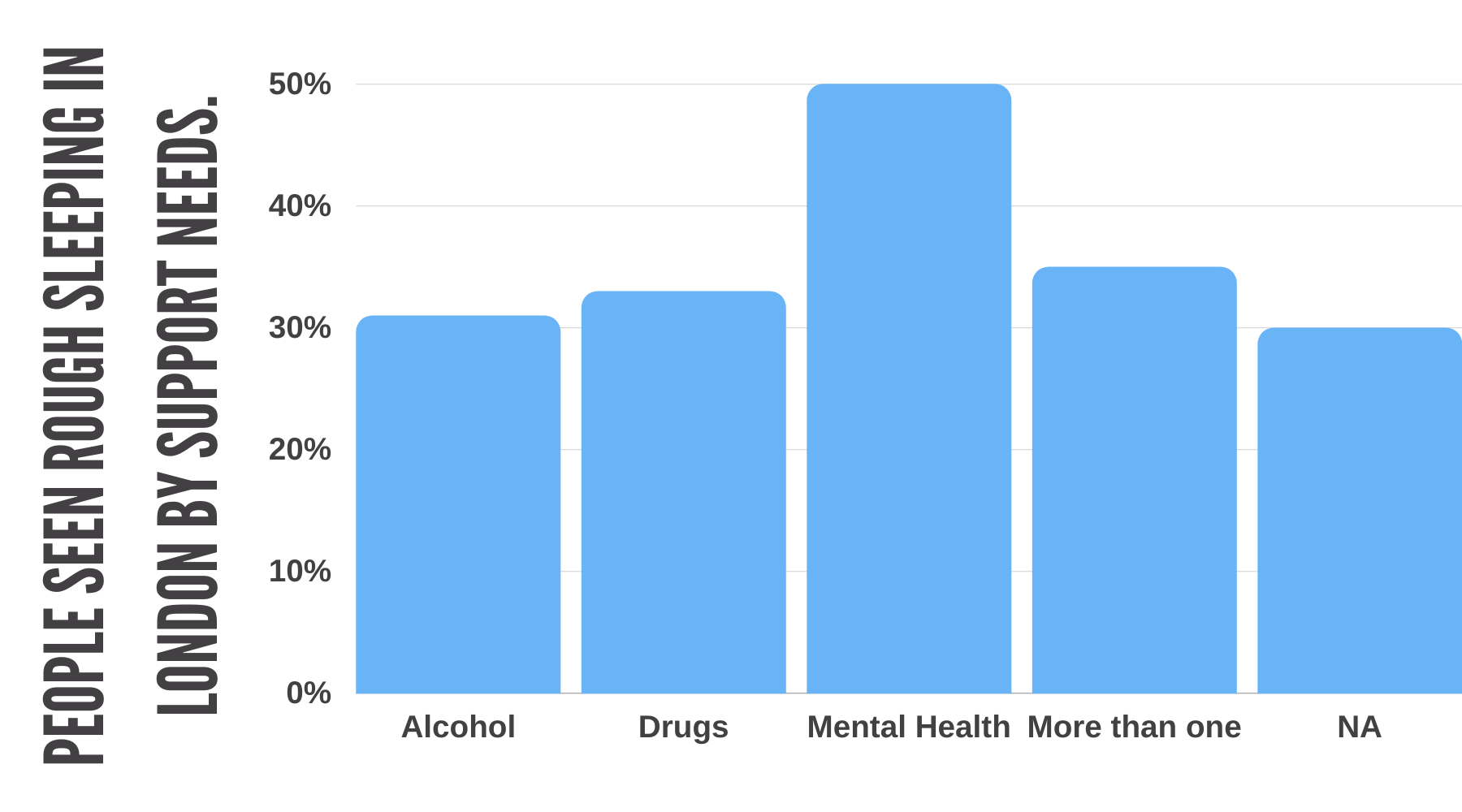No single factor can explain the rise in homelessness. The reasons for homelessness are complex and interconnected.
With that said, the lack of affordable housing seems to be a significant root cause for many. This has largely been impacted by the cost of living crisis.
Additionally, people sleeping rough face an acute shortage of suitable types of accommodation, and little support is available for people trying to transition away from the streets. This is partly due to a lack of coordination in service delivery.
For example, many people we work with face complex needs (like struggling with addiction, poor health, and/or immigration issues) in addition to housing issues. Few services offer support in all these areas and often fail to address all these factors as contributors to someone’s time on the streets.
The Cost of Living Crisis and Homelessness

Note: Data from Department for Levelling Up, Housing & Communities
Shelter has found that 309,000 people are homeless as of last year, a 14% increase in just 12 months.
This rise in homelessness is most likely to affect low-income homes as it’s predicted that 133% of their income would be needed to cover basics such as rent, food, and energy by the new year (on average). This comes as energy bills are predicted to cost more than ever, increasing nearly 90% in our Adelaide Street day centre alone.
Additionally, as house prices rise, renting costs are likely to continue rising, leading to more people experiencing homelessness. The lack of affordable housing affects the rented sector by pricing people out of the market. People in high-cost rent areas, such as Westminster and wider London, are most at risk of homelessness because of this.
Lack of Affordable Housing and Rent
Currently, the average rent in Westminster is £2,528 with the average rental price rising by 9.4% since 2020 across London. This is occurring while wages are stable or falling in real terms.
This shows the difficulty in renting for people on lower incomes, pushing many who would otherwise be able to afford their basic needs into homelessness, regardless of their employment status.
This is not only about creating more “affordable homes”, although this may play a role, but a total system change to fix our broken housing system.
The problem of homes being too expensive is made worse because landlords often don’t want to rent to people who get housing benefits. This conclusion comes from both looking at the data and talking to local authorities. They said:
Factors Specific to Rough Sleeping
The lack of affordability, including changes to the benefit system, appears to have boosted rough sleeping consistently. However, there are other specific factors that are likely to affect rough sleeping, including:
80% of people sleeping rough experience problems with their mental health, drugs, and/or alcohol, with corresponding support needs. This is illustrated in the chart below.
This can be a vicious cycle – people sleeping rough develop problems due to their circumstances, while those with problems are more likely to find themselves sleeping rough. Additionally, many services will refuse help to those facing complex needs due to a lack of suitable resources. The Connection at St. Martins is one of the few homelessness charities working with those with complex needs.

Source: Chain Report 2022/23
Non-UK Nationals
In London, we’re seeing a large increase in non-UK nationals sleeping rough. This increase is likely linked to restrictions that came into effect in recent years relating to migrants’ access to benefits, including housing-related benefits.
EEA citizens in particular are almost twice as likely to experience the worst forms of homelessness in comparison to the general adult population. The causes of homelessness for this group are complex and nuanced. This includes a combination of individual factors, such as relationship issues with family, and systemic barriers that prevent people from accessing suitable support.
Escaping homelessness is often made difficult by lacking support systems for people without UK nationality. You can learn more about our work with non-UK national people here.
Join The Connection Community to stay up-to-date on our work:
Last updated: 31/07/2024

